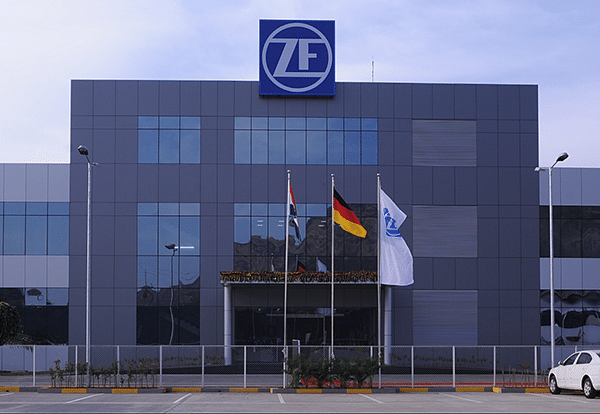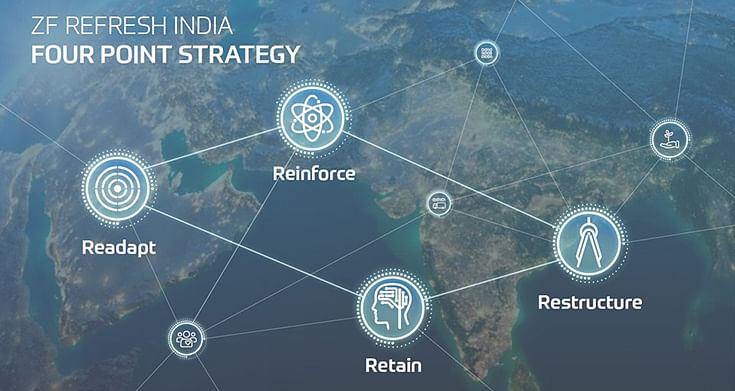ZF Group to quadruple global component sourcing spend in India to 2 billion euros by 2030
The German Tier-1 major, which currently sources around 500 million euros worth of components from India a year, is bullish about the Indian supply chain’s commitment towards quality, sustainability as well as future-investment readiness.
The ZF Group is betting big on India. The German Tier-1 major, which has defined its future roadmap into four broad product categories – vehicle motion-control systems, e-mobility technologies, integrated safety systems, and autonomous driving solutions – to determine its growth in a transforming mobility landscape, is bullish about significantly growing its global component sourcing from India in the coming years.
The ZF Group has set itself a target to quadruple or increase its existing component and material sourcing by four times from its supply base in the country.
“ZF’s goal is to considerably grow our global sourcing volume from India. We have an ambitious target of scaling our existing spend of approximately 500 million euros (Rs 4,394 crore) to 2 billion euros (Rs 17,576 crore) by 2030. We are quite optimistic that we will surpass this target, and there are already talks to revisit it,” Joerg Schaupp, Senior Vice-President, Global Commodity and Purchase, ZF Group, told Autocar Professional, in an exclusive interview during his recent visit to India.
“While it is an ambitious target, it would still comprise only 5 percent of ZF’s overall global sourcing spend. So, there is a significant headroom for India to grow, and it needs consistent commitment towards quality, logistics, cost competitiveness and sustainability. Having said that, we can clearly see the Indian supply base stepping up on these aspects and understanding that meeting these parameters is immensely crucial for its future growth,” Schaupp added.
Focus on resilience of supply chain
The German components major is undergoing a significant transformation in its sourcing processes, which are increasingly giving weightage to the resilience of the supply chain as an important aspect after the Covid-19 pandemic. “The industry has seen several iterations of the supply chain disruption which started with the semiconductor crisis, and then proceeded towards raw material challenges, as well as high logistics prices.
“The ZF Group has always scanned for the best-sourcing options for the company and not relying predominantly on just one source. While the total cost of sourcing plays a key role in determining a material sourcing location, what we are now incorporating in our sourcing process is giving more focus on considering the resilience of the supply chain, which is increasingly becoming extremely important. What is also gaining precedence is sustainability, and human rights. Therefore, we need to have a good balance of everything and we are continuously looking at all the options,” he explained.
 The ZF Group is particularly confident about India Component Inc’s prospects, not just with respect to driving ZF’s domestic operations in the country but also tapping into the big opportunity from an export perspective.
The ZF Group is particularly confident about India Component Inc’s prospects, not just with respect to driving ZF’s domestic operations in the country but also tapping into the big opportunity from an export perspective.
India: an export driver for ZF too
The Group is particularly confident about India Component Inc’s prospects, not just with respect to driving ZF’s domestic operations in the country, but also tapping into the great opportunities from an export perspective as well.
“I am positively surprised with my visit to India that has made me observe the clear dedication, commitment as well as ambitious plans of ZF’s Indian supply base, comprising both existing as well as new suppliers. On one hand, they are ready to go and seize opportunities out there, the Indian suppliers also have the financial capability to invest from a long-term perspective, and be part of ZF’s strategy towards innovating next-generation mobility solutions,” Schaupp noted.
“India has also made tremendous progress with its commitment towards sustainability and Indian automotive suppliers are committed to drive full end-to-end green production. They are moving very quickly and everyone is eager to explore, not just the local market, but tap into the export opportunities as well. And this could be a clear game-changer for the Indian automotive components industry,” he added.
Schaupp said that India is going to play a critical role in supplying towards most of the components required by ZF’s end customers, predominantly in European markets, while also expanding their footprint to the US market as well. The German Tier-1 major is also ready to invest in the Indian supply base to augment their capabilities to cater to global demand.
 ZF's ‘Refresh India’ strategy, rolled out in June 2021, is payind dividends. The four-pronged strategy is designed to rapidly grow its business in one of the largest automotive markets in the world.
ZF's ‘Refresh India’ strategy, rolled out in June 2021, is payind dividends. The four-pronged strategy is designed to rapidly grow its business in one of the largest automotive markets in the world.
Agility: the new normal
With its aim to source components and materials across the entire spectrum of its high-technology end products for its customers, the company believes that the lack of a well-established local supply chain for electronics components would not impact India’s cost competitiveness. “We do see the same scenario in other countries as well where the product is being locally manufactured, albeit with the import of certain chips and electronics components. This does not hinder the product’s cost competitiveness on the world market as semiconductor manufacturing is largely concentrated only in a few locations around the world,” pointed out Schaupp.
The company believes that the supply chain is out of the woods with respect to the vexing chip crisis, which wreaked havoc across the global automotive industry. However, it continues to deploy a taskforce as the semiconductor capacity for the automotive industry has still not achieved a sustained revival to its earlier peak. Moreover, while the headwinds caused by the slowdown in the European and US markets remain, the pandemic has imparted huge lessons in terms of being agile and flexible.
“What we have learnt from the supply chain crisis over the past couple of years is that we need to adapt to a much more flexible way of how we conduct our business. So, there is no fixed operational plan anymore, rather we need to work on a rolling, monthly-forecast model, and take the external factors into consideration, and then adapt the operations carefully. We also need to maintain flexibility in our operations and be ready to downsize based on the demand. While this factor of agility could be in the range of 10 percent of the capacity, it has gone up to 30 percent in the new normal,” Schaupp signed off on a pragmatic note.
RELATED ARTICLES
Cosmo First diversifies into paint protection film and ceramic coatings
The Aurangabad, Maharashtra-based packaging materials supplier is leveraging its competencies in plastic films and speci...
JSW MG Motor India confident of selling 1,000 M9 electric MPVs in first year
The 5.2-metre-long, seven-seater luxury electric MPV, which will be locally assembled at the Halol plant in Gujarat, wil...
Modern Automotives targets 25% CAGR in forged components by FY2031, diversifies into e-3Ws
The Tier-1 component supplier of forged components such as connecting rods, crankshafts, tie-rods, and fork bridges to l...






 27 Feb 2023
27 Feb 2023
 10901 Views
10901 Views










 Autocar Professional Bureau
Autocar Professional Bureau




